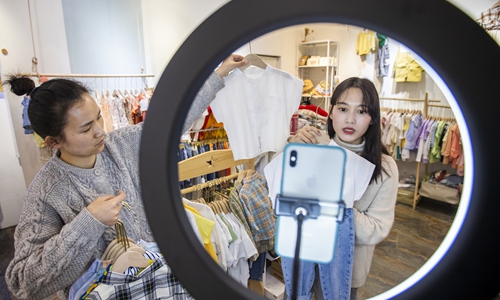Cities use innovative tactics to boost consumption
Source:Global Times Published: 2020/4/20 23:28:40

Employees of a children's clothing store in Wenzhou, East China's Zhejiang Province, held a live broadcast featuring children's wear on Tuesday. As consumption gradually recovers from the fallout of COVID-19, more businesses are seeking opportunities online. Photo: CNSphoto
Consumer activity in China is gradually picking up in response to innovative campaigns by various cities.
Shanghai will launch a late night shopping festival to boost spending starting from May. Running till June, a number of cultural and tourist venues, shopping malls, restaurants, theaters and bookstores will stay open until midnight.
A number of Chinese cities have launched innovative online and physical campaigns to lift consumption, which has been hit by the coronavirus.
Beijing, for example, has conducted a promotion campaign to encourage companies to sell products online since mid-March. The sales of 70 key participating companies increased by an average of 30 percent during the first week of the campaign.
Guangzhou in South China's Guangdong Province has launched a gourmet "hunting" campaign to encourage local shoppers to explore the delicacies of time-honored restaurants in the city in an effort to boost the catering industry.
Shenzhen, also in Guangdong, is working with JD.com and other e-commerce platforms to sell local specialties online and it has issued discount coupons to help the sales of agricultural products harvested by local farmers.
Consumer activity has showed signs of warming up nationwide. More than 80 percent of the malls across the country have resumed operations, according to data released by the China Department Store and Commercial Association on April 13.
The average daily transaction values of the accommodation and catering industries during the Qingming festival increased 11.5 percent and 10 percent, respectively, compared with mid-March, and values have restored to half of the same period last year, according to a survey by UnionPay.
However, the difficulty of resuming consumption still lies in improving the psychology of consumers in the wake of the coronavirus outbreak in Europe and the US, and increasing imported cases, Dong Dengxin, director of the Finance and Securities Institute at Wuhan University, told the Global Times on Monday.
"Concerns about the epidemic have not been eliminated. You still wear a mask and have your temperature taken to enter a mall, and therefore consumers are still cautious about the coronavirus risks when they go someplace," Dong said.
As the epidemic has not been completely ended, people are still worried about the possibility of infection. When it's time to take off the masks, there may be a strong rebound of consumption, Shi Jianxun, an economics professor at the School of Economics and Management of Tongji University, told the Global Times on Monday.
"Measures to stimulate consumption still need to be bolstered by increasing the issue of consumer coupons and extending the coverage to a wider range of industries," he noted.
Posted in: ECONOMY